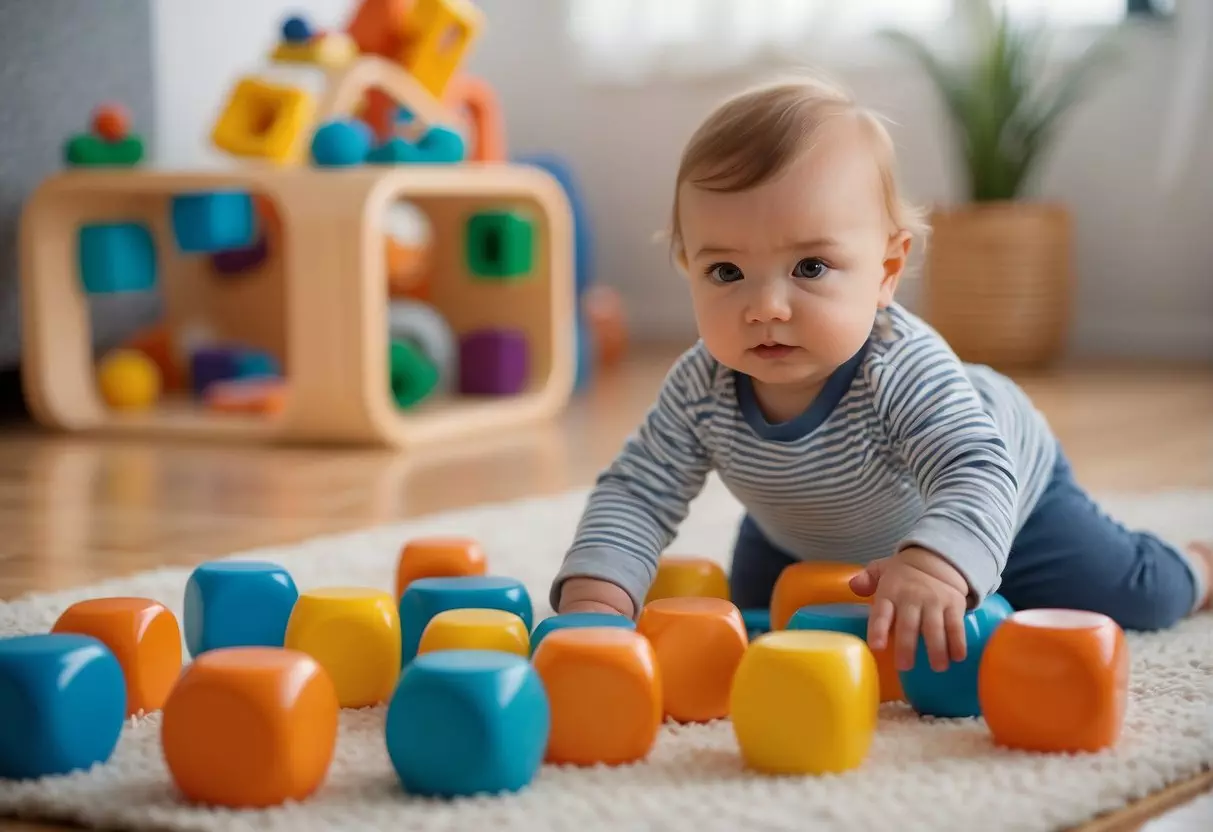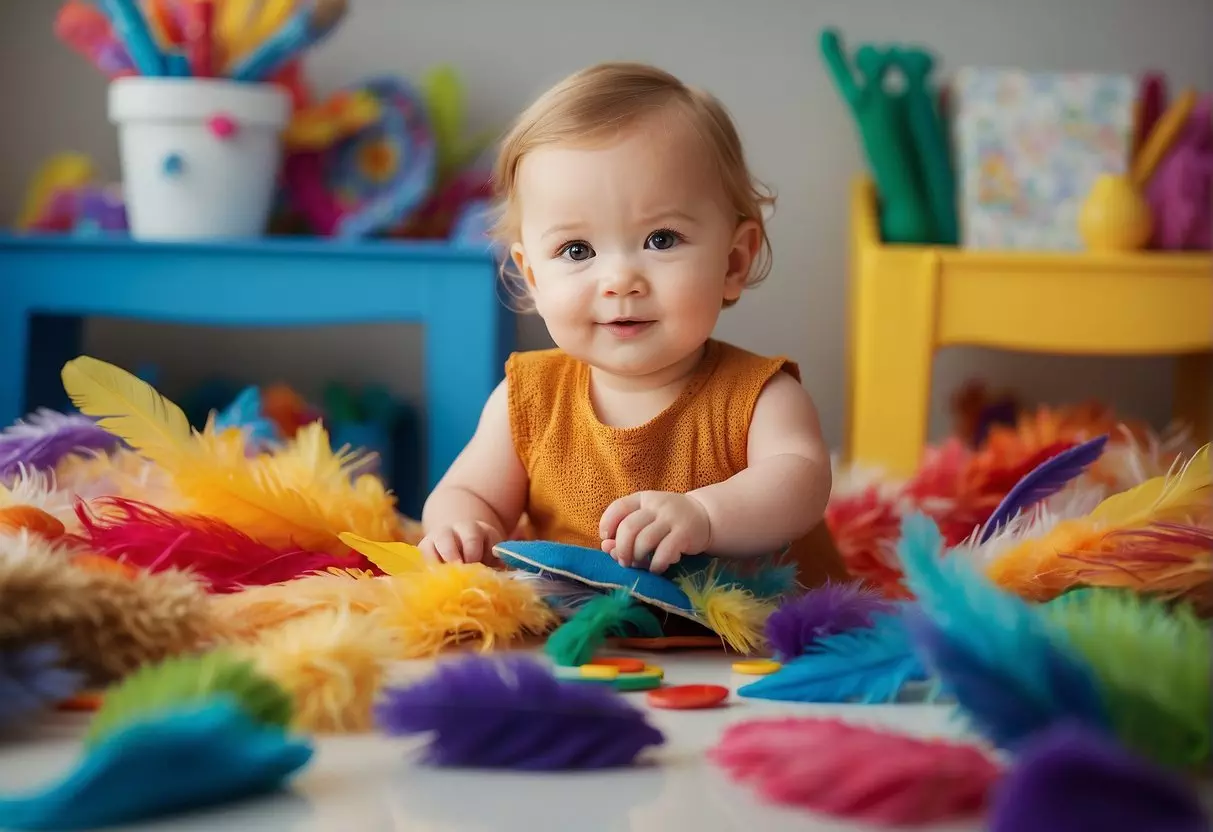Activities for a 12-Month-Old: Engaging Ideas for Fun and Development
Engaging your 12-month-old in a variety of activities is crucial for their development, but finding age-appropriate, developmental activities for your little one can sometimes be a challenge. At this stage, your baby is likely on the move, curious, and ready to explore the world around them. It’s important to create an environment where they can safely discover and learn new things, honing skills that will serve as the building blocks for future learning.

With the right set of activities, you can facilitate your baby’s growth in key areas such as fine motor skills, vocabulary, and hand-eye coordination. From simple water play that helps them understand cause and effect to activities that build their vocabulary and hand-eye coordination, there’s no shortage of creative and fun ways to play. Remember, the goal is to foster a love for learning and exploration, making each new experience enjoyable and beneficial for your 12-month-old’s development.
By incorporating play into everyday routines, you create valuable learning opportunities. Activities that require minimal prep and utilize common household items can be especially helpful, as they make it easy to set up an engaging play session at any time. Your 12-month-old is like a little sponge, ready to soak up all the learning opportunities that come their way, so take this chance to introduce them to a world of fun, developmental play.
Table of Contents
Sensory and Motor Skill Development
In the first years of life, you’ll notice a rapid development in your child’s sensory and motor skills. Engaging your 12-month-old in activities that stimulate their senses, enhance fine motor control, and encourage gross motor development is crucial for their overall growth.
Sensory Exploration with Nature
Introduce your little one to the wonders of nature to spark their sensory play. You can create a sensory bin with items like leaves, flowers, and differently textured elements found outdoors. Encourage your child to touch and feel, which helps them understand different textures and colors, boosting their sensory development and their connection with nature.
Enhancing Fine Motor Skills Through Play
For fine motor skill enhancement, simple household items can become tools for development. Provide objects of various shapes and sizes, like blocks or soft toys, and allow your child to grasp and manipulate them. This kind of play fortifies their fine motor skills and lays the groundwork for skills like hand-eye coordination. Initiatives such as water play with cups and spoons during bath time not only make for an enjoyable experience but also improve motor control.
Gross Motor Milestones and Games
Your child will be hitting several gross motor milestones, including crawling and possibly taking their first steps toward walking. Encourage activities that support these skills, such as tummy time, which strengthens back and neck muscles, or safe spaces where they can pull themselves up to stand. Simple games like rolling a ball back and forth can promote these large muscle movements and help tune their coordination.
Creative Arts and Craft Activities

Encouraging creativity in your little one is both fun and beneficial for their development. Through simple art projects and musical exploration, you can enhance their fine motor skills and sensory processing.
Simple Art Projects for Little Hands
Introduce your child to the world of colors with finger painting. All you need is non-toxic, washable paint, and some paper to create a masterpiece. The tactile experience is thrilling for 12-month-olds as they spread, swirl, and pat down bright colors on paper, making unique patterns.
Crayons are another great tool for your little artist. Although the grasp might still be developing, chunky, easy-to-hold crayons encourage your child to draw and scribble, which helps in strengthening their grip and coordination.
Last but not least, don’t forget about stickers! Peeling and placing stickers on paper can be a delightful challenge that enhances fine motor skills. Plus, it’s a great activity that doesn’t get too messy.
Musical Discovery and Enjoyment
Music is a universal language that can excite and calm alike, and it’s never too early to introduce your child to instruments. Simple instruments like maracas or a homemade drum can allow them to explore sounds and rhythms. Your little one can tap, shake, and bang on these instruments, leading to a joyful noise and a fundamental understanding of cause and effect.
Singing together with your child can be a heartwarming activity that reinforces language skills and can introduce rhythm and rhyme. Additionally, you can combine music with movement, encouraging your child to sway, clap, and bounce to the beat, nurturing a love for music and rhythm.
Incorporating painting with food coloring into your playtime is another safe and creative way to engage their senses. It encourages color recognition and offers a taste-safe way to paint if they’re inclined to explore with their mouth.
Cognitive Growth and Problem Solving
The cognitive milestones at 12 months are crucial; your little one is now ready to challenge their mind with activities that enhance problem-solving skills and understanding of cause and effect. Engaging in the right games can promote these skills in a fun and supportive setting.

Learning Through Playful Puzzles
Your child can start with simple puzzles designed for their age. These may include large pieces that fit into easily distinguishable spots. As your baby manipulates these pieces, they learn the basics of problem-solving and the satisfaction of a challenge met. Begin with puzzles that have knobs for easy gripping or those with only a few pieces to match. Blocks are also excellent tools; encourage stacking and arranging to further develop their spatial awareness.
Games Fostering Object Permanence
Playing peekaboo and hide and seek with objects teaches your baby that things continue to exist even when they can’t see them, which is an important aspect of object permanence. Start by hiding a toy under a blanket and watch as your child discovers it. As their understanding grows, you can increase the complexity by hiding objects in different locations for them to find.
Language and Social Development
At 12 months old, your child is on the verge of blossoming socially and linguistically. By engaging in specific activities, you can encourage their language acquisition and social development.
Reading and Storytelling Sessions
Board books are your best friends when it comes to reading with your little one. Choose books with bright images and simple texts to capture their attention. As you read aloud, point to pictures and articulate the words clearly to build their vocabulary and listening skills. It’s not just about reading the words; make the session dynamic by using different voices or incorporating rhyming, which helps them pick up on language patterns.
-
Why Board Books?
- Sturdy for little hands
- Engaging pictures
- Simple text great for literacy development
-
Session Tips:
- Use expressive voices for different characters.
- Ask questions about the images to prompt interaction.
- Emphasize rhyming words and patterns.
Interactive Play and Social Skills
Interactive play is essential for developing social skills and bonding with your child. During playtime, encourage games that involve back-and-forth interaction, which fosters imitation and socialization. For instance, play peek-a-boo or mimic animal sounds and actions together. When your child attempts to imitate these sounds or actions, it’s not just adorable – it’s them practicing essential communication skills.
- Play Ideas:
- Peek-a-boo: Encourages anticipation and joy in interaction.
- Animal sounds: Fun way to practice speech and imitation.
By incorporating these activities into your routine, you are setting a solid foundation for your child’s language and social skills development.
Active Outdoor Play
Outdoor play is vital for your 12-month-old’s development. It encourages physical activity, sensory experiences, and a connection with nature. Let’s dive into how you can facilitate this enriching experience for your little one.
Engaging with Nature and Outdoors
When you take your child outside, introduce them to the simplicity and beauty of nature. Point out the vibrant flowers and the various shapes of leaves, which can lead to a mini-lesson on colors and textures. Have stickers handy to match them with what you find, making it a fun identification game. Even a simple game of peek-a-boo behind a tree can be a delightful way to engage with the surroundings.
Physical Activities and Exploration
Encourage your child to explore and improve their motor skills with ball play in the open space. Tossing a soft ball back and forth will not only help develop coordination but is also a fun way to interact. For a different activity, you could create an obstacle course with cushions and safe objects for your child to crawl over and around, making exploration a thrilling adventure.
Remember, active outdoor play is not just about the movements; it’s about touching, feeling, and connecting with the world outside. Whether it’s through bird watching or rolling a ball, each activity supports their development in an engaging and enjoyable manner.
